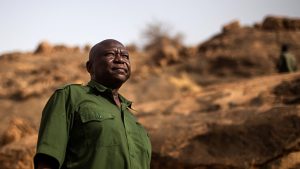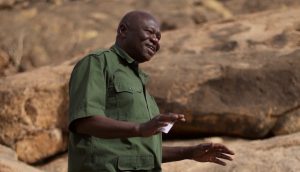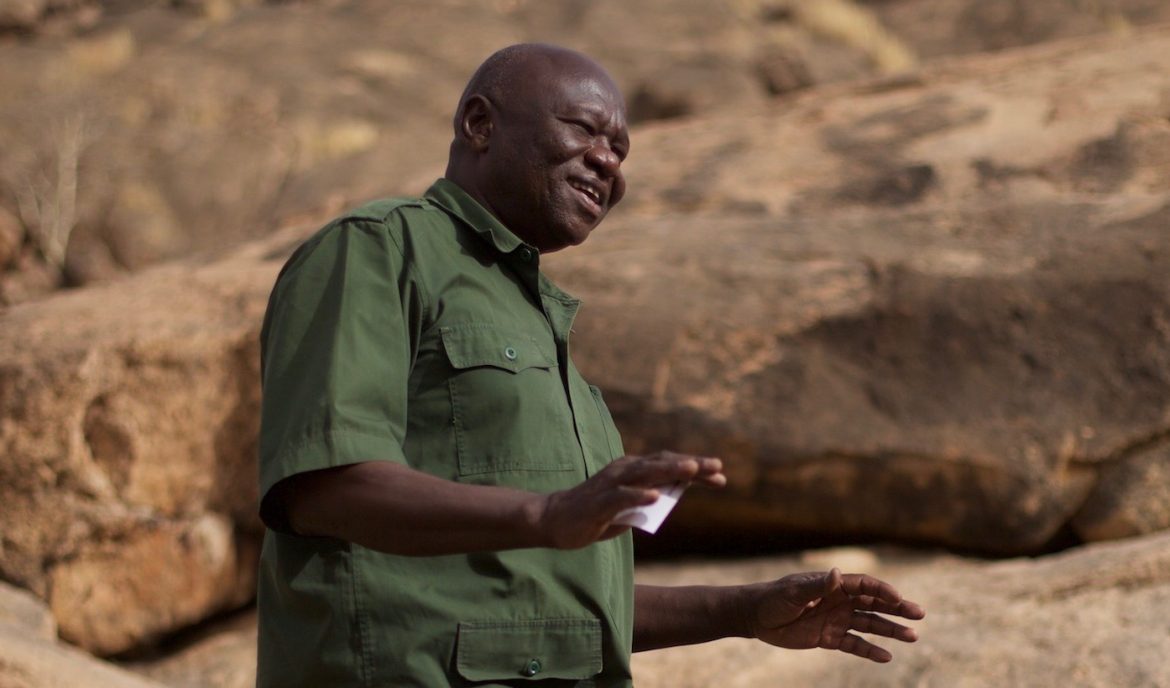SPLM-N Deputy Chairman Abdel-Aziz Hilu tells Nuba Reports why he offered his resignation and his concerns for the future of the Sudan People’s Liberation Movement – North (SPLM-N).
1) Why did you decide to submit your resignation at this particular point in time? Why now?
I submitted my resignation at this time as a result of the escalating crisis within the movement and the poor prospects for a solution vis-a-vis three national executive officers. This is in addition to the lack of consideration given by the leadership to the opinions of the many people in the movement itself.
Another factor concerns the SPLM-N plunging head-first impetuously into the negotiation process with the regime [the ruling National Congress Party] to reach any kind of deal without considering the outcomes and if it will honestly lead to achieving some sort of democratic transformation or not.
2) Was the resignation letter addressed to the public? Why was it sent to the Nuba Liberation Council?
Yes, the resignation letter* was an internal document meant for the Liberation Council’s meeting, and it boldly presented and with transparency the nature of the internal crisis, the key points that must be taken into consideration during the Council’s deliberations to leave, as well as recommendations on how to get out of this crisis.
But the leaking of the letter at this time, led to the intervention of outside parties and caused a stir which led to the negative outcome of pulling peoples’ attention away from the core issues broached in the letter itself. I addressed the letter to the Liberation Council of the Nuba Mountain Region because it’s the highest legislative political institution existing in the absence of a national liberation council. The leak polarized the executive officers and resulted in the chairman and secretary-general becoming part of the dispute.

SPLM-N Abdel Aziz Hilu (Nuba Reports)
3) How do you respond to those who say that the current Liberation Council of the Nuba Mountain Region isn’t legitimate?
This council has been in existence since 2013, and this meeting took place with the knowledge and agreement of the president and the general secretary. So the talk about this council’s lack of legitimacy has come in my opinion from those opposing its decisions and recommendations. But it’s enough that it represents the people of the Nuba Mountain Region and this is more than enough to grant it with the greatest legitimacy.
4) The Sudan People’s Liberation Movement-North (SPLM-N) has accused the Regional Liberation Council of overriding its authority; it has also claimed that some of those from outside of the membership snuck into the body. Do you agree? Did the council override the authority of the movement? Or is this a way to silence the opposition and ignore democratic principles?
The National Leadership Council that has come up with these accusations, itself isn’t elected, so what right do they have to contest the legitimacy of the decisions made by the Regional Liberation Council? The representatives of the people in the region have the right to discuss all the issues and policies via the leadership, which exerts influence on the people of the region.
As for the matter of external participants from outside the membership of the council, this is a matter of course because the parliamentary norms allow the councils to seek advice from experts to help them carry out their tasks professionally, but with the caveat that the experts don’t have the right to cast their ballots at election time. All in all, it’s a flimsy argument and doesn’t detract from the legitimacy or the authority of the council. As I said earlier, the origin of this criticism isn’t objective; it’s the lack of satisfaction of some parties with the outcomes of the council’s meetings and an attempt to find justifications to invalidate these outcomes.
5) According to the latest SPLM-N press release, there are a number of points that address some of the concerns that you raised and shed light on in your resignation letter. But, do these measures in fact address everything adequately in your opinion?
In Ardol’s (Spokesperson Mubarak Ardol) statement there is a declaration and acknowledgement of the crisis and flaws in the organization, like the lack of documents such as the manifesto, lack of a structure or formation of institutions, lack of a commitment to institutionalization –and the lack of a commitment to the principle of fair representation for constituents. But the statement is full of contradictions and lacks commitment to democratic values. It resorts to top-down decisions that sideline attempts to fuse the spirit of inclusiveness. Annulling the decisions and recommendations of the representatives of the people, and then taking these very recommendations and applying them but with the orders of the leadership up top –This means, ‘it’s got to be me who does it, not you’. This commanding tone won’t help in finding a cure for the ailments of the organization.

Cdr. Abdel-Aziz Hilu (Nuba Reports)
6) If the SPLM-N addresses most of your concerns that you shed light on in your letter, will you reconsider resigning and continue in your post as the Deputy Chairman of the SPLM-N?
The point of my resignation was to pave the way to correct the movement’s institutions and solve the organizational issues in a collective and democratic manner. It is not my intention at all to secure a higher post, but rather my goal is to see the SPLM-N go in the right direction to achieve the dream of a new Sudan.
7) How do you think the People’s Movement, as a movement that is found all over Sudan, will be affected by your resignation and the leaking of your letter to the Liberation Council?
The People’s Movement for the Liberation of Sudan as an organization and as a vision won’t be affected by the leaving of one person, no matter his contributions, or even the leaving of several individuals. Me, I’m one person, and my absence won’t affect the course of the struggle. But instead my resignation will open the doors for the movement to eradicate the negative effects of having me in the position of Deputy Chairman. It will move forward with strength and efficiency towards its goals. As for the matter of my resignation letter being leaked, maybe it was meant to happen, that the Sudanese people know the facts about the internal crisis in the Movement in order to solve it. As they say, “it’s a blessing in disguise.”
8) Your decision to resign and the opinions you expressed were accepted in Nuba and your stance was met with resounding support. Does this mean that the Nuba population has been frustrated with the SPLM-N leadership for a while now?
Every follower of social media sites and the newspapers since 2013 will have observed the restlessness in the Movement’s circles of membership –the numerous critiques directed at the Movement’s leadership. This wasn’t limited to the bases in the Nuba Mountains only, but also included most of the membership of the Movement in all of its sectors. The Council for the Liberation of the Nuba Mountains agreed with my letter because it expressed what they were feeling and touched upon the same issues that they have been suffering from for a long time now, and they haven’t found anyone to listen to them.
“The People’s Movement can’t split into two because the movement is a vision and it has clear goals, either a new Sudan or the old one with its known ailments.”
9) Do you fear the possibility that the SPLM-N will split into two camps?
The People’s Movement can’t split into two because the movement is a vision and it has clear goals, either a new Sudan or the old one with its known ailments. So the representatives of the old Sudan will go, and the representatives of the new Sudan will stay. The movement is one, the goal is one, and it is part and parcel of the movement.
10) The SPLM-N has agreed to add additional individuals to the Addis Ababa negotiation delegation but Yasir Arman will still lead the talks. What are the guarantees, if any, given to you regarding your concerns of self-determination, the integration of the army? How will these concerns be addressed?
The issue is not one of how many people are on the negotiating team or leading it. The issue is the method of specifying the desired goal that is to be achieved through the negotiation process. As long as there is agreement on a clear goal and the boundaries specified, it doesn’t matter who represents the organization or leads the negotiation team.
11) The dictionary definition for “self-determination” is:
‘The process by which a country determines its own statehood and forms its own allegiances and government.’
–This is a term you espouse should be raised in the Addis Ababa negotiations. To clarify, are you suggesting for the two areas to achieve complete independence like South Sudan? The National Congress Party has refused outright this demand in its peace talks, according to news reports. Is it possible that this demand will prevent the progress of peace negotiations?
The SPLM-N calls for voluntary unity or unity by choice as a principle. In this context, the demand for self-determination is a conditional sentence, either for the new secular democratic unified Sudan or self-determination. But those who are biased have stripped the sentence of its conditionality, and thus are attacking it out of context…and unfortunately they are many. Some of them are even connected with the project for a new Sudan.
We don’t care about what the National Congress says or their opinion on the demand for self-determination, it’s actually within their right to even refuse hearing this word as it’s a democratic mechanism that strips the ruling party of its hegemony.
We who are asking for self-determination are aiming to address the roots of the crisis to find effective solutions that put an end once and for all to the debilitating wars going on in Sudan since 1955. Ending these wars to allow the Sudanese people to devote themselves to building, urbanization and catching up with the developed world. As for the right to independence, it isn’t too much or out of reach for the Nuba people but the priority right now is fair unity.
“It’s actually upon those terrorizing the Nuba to ask themselves first, what are they offering these people and others to attract them to choose unity or for Sudan to remain united?”
12) What do you say to those who fear that people of Nuba will ask to secede, and that your resignation letter sparked this demand?
These are the fears of the ones supporting those in charge, the ones calling for hegemony and unilateralism in a nation that is only characterized by diversity. These fears are baseless. Why would the Nuba people accept living as second-class citizens in their own country with the sword of jihad hanging over their heads since 1992? The central government has focused solely on fighting and attacking the Nuba by all means…from chemical weapons to aerial bombs to artillery shelling to decimate the Nuba and occupy their lands. So it’s actually upon those terrorizing the Nuba to ask themselves first, what are they offering these people and others to attract them to choose unity or for Sudan to remain united?
13) Please clarify, how do you think that self-determination and the vision of a new Sudan can work hand in hand? Some people see these as two different paths.
The vision of a new Sudan includes the right to self-determination because it is a human and democratic right for peoples and it is in addition to the principle of fair unity, which is based on freedom, justice and equality. These three put an end to the disparities and inequalities present since the establishment of the Sudanese nation. If some want to hold on to their privileges, let them do so. But they must leave others alone. Here comes in the concept of unity of one’s free will.
14) One point that you raise in your letter is the decision of the SPLM-N leadership to allow the integration of the national army into the Sudanese armed forces if a peace accord is struck. Disarming was one of the reasons that led the SPLA-N to war in 2011. What could be the reason or the motive behind this decision in your opinion?
I don’t know their motives. But what’s important is that everyone is aware of the National Congress Party’s nature of doing things and its history of not upholding agreements. The ruling party doesn’t want to give any concessions leading to a just and permanent peaceful solution to the Sudanese problem. Khartoum’s goal from these negotiations is to collect all the weapons from the SPLA-N and then go back to exclusionary policies against the Nuba and other marginalized peoples, like it’s doing right now in Darfur by targeting civilians and in Khartoum by using excessive force in dealing with unarmed demonstrators.
15) A press release from the SPLM-N announced that it plans to open a new military front in Darfur, is this true? Does the SPLM-N have these capabilities?
This is misplaced propaganda because the opening of military fronts doesn’t happen through press releases.
“The existence of hundreds of different Sudanese ethnicities in the SPLA-N is proof of respecting the other and accepting him in the ranks of the Popular Army.”
16) There is quite a lot of propaganda against you – for example, claims about your ethnicity. Does it affect you? Does this mean that despite all the efforts of the SPLM-N for national inclusivity, the SPLM-N still remains motivated by ethnicity and unable to welcome other communities?
These campaigns that exploit ethnicity don’t affect my morale because it always comes from those who oppose the project and it’s nothing new. But lately the propaganda has targeted me being the Deputy Chairman in order to pass an agenda that will harm the future of the revolution. That’s why I alluded to all this in my letter. As for the SPLM-N itself, it’s a national movement open to all Sudanese, regardless of their ethnicity. Proof of this — I joined in 1985 and the decision of the Regional Liberation Council to reject my resignation and persist in me representing the region in the post of Deputy Chairman is the best piece of evidence of the movement’s nationalist character. Also the existence of hundreds of different Sudanese ethnicities in the SPLA-N is proof of respecting the other and accepting him in the ranks of the Popular Army.
17) What is your hope for the future of the Movement in Sudan?
My hope is that the SPLM-N will overcome this crisis and come out of it stronger than it was and more democratic. With group participation in making decisions in order to take the SPLM-N’s rightful place in leading the process of change in Sudan and putting an end to the wars and conflicts in the nation today.
*Please see an official translation of SPLM-N Deputy Chairman Abdel-Aziz Hilu’s resignation letter here .





